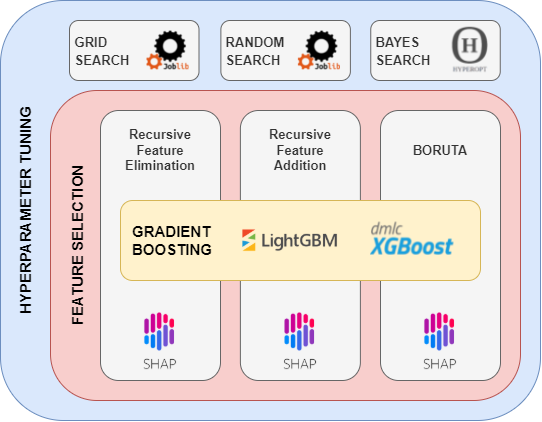A python package for simultaneous Hyperparameters Tuning and Features Selection for Gradient Boosting Models.
Project description
shap-hypetune
A python package for simultaneous Hyperparameters Tuning and Features Selection for Gradient Boosting Models.
Overview
Hyperparameters tuning and features selection are two common steps in every machine learning pipeline. Most of the time they are computed separately and independently. This may result in suboptimal performances and in a more time expensive process.
shap-hypetune aims to combine hyperparameters tuning and features selection in a single pipeline optimizing the optimal number of features while searching for the optimal parameters configuration. Hyperparameters Tuning or Features Selection can also be carried out as standalone operations.
shap-hypetune main features:
- designed for gradient boosting models, as LGBModel or XGBModel;
- developed to be integrable with the scikit-learn ecosystem;
- effective in both classification or regression tasks;
- customizable training process, supporting early-stopping and all the other fitting options available in the standard algorithms api;
- ranking feature selection algorithms: Recursive Feature Elimination (RFE); Recursive Feature Addition (RFA); or Boruta;
- classical boosting based feature importances or SHAP feature importances (the later can be computed also on the eval_set);
- apply grid-search, random-search, or bayesian-search (from hyperopt);
- parallelized computations with joblib.
Installation
pip install --upgrade shap-hypetune
lightgbm, xgboost are not needed requirements. The module depends only on NumPy, shap, scikit-learn and hyperopt. Python 3.6 or above is supported.
Media
Usage
from shaphypetune import BoostSearch, BoostRFE, BoostRFA, BoostBoruta
Hyperparameters Tuning
BoostSearch(
estimator, # LGBModel or XGBModel
param_grid=None, # parameters to be optimized
greater_is_better=False, # minimize or maximize the monitored score
n_iter=None, # number of sampled parameter configurations
sampling_seed=None, # the seed used for parameter sampling
verbose=1, # verbosity mode
n_jobs=None # number of jobs to run in parallel
)
Feature Selection (RFE)
BoostRFE(
estimator, # LGBModel or XGBModel
min_features_to_select=None, # the minimum number of features to be selected
step=1, # number of features to remove at each iteration
param_grid=None, # parameters to be optimized
greater_is_better=False, # minimize or maximize the monitored score
importance_type='feature_importances', # which importance measure to use: default or shap
train_importance=True, # where to compute the shap feature importance
n_iter=None, # number of sampled parameter configurations
sampling_seed=None, # the seed used for parameter sampling
verbose=1, # verbosity mode
n_jobs=None # number of jobs to run in parallel
)
Feature Selection (BORUTA)
BoostBoruta(
estimator, # LGBModel or XGBModel
perc=100, # threshold used to compare shadow and real features
alpha=0.05, # p-value levels for feature rejection
max_iter=100, # maximum Boruta iterations to perform
early_stopping_boruta_rounds=None, # maximum iterations without confirming a feature
param_grid=None, # parameters to be optimized
greater_is_better=False, # minimize or maximize the monitored score
importance_type='feature_importances', # which importance measure to use: default or shap
train_importance=True, # where to compute the shap feature importance
n_iter=None, # number of sampled parameter configurations
sampling_seed=None, # the seed used for parameter sampling
verbose=1, # verbosity mode
n_jobs=None # number of jobs to run in parallel
)
Feature Selection (RFA)
BoostRFA(
estimator, # LGBModel or XGBModel
min_features_to_select=None, # the minimum number of features to be selected
step=1, # number of features to remove at each iteration
param_grid=None, # parameters to be optimized
greater_is_better=False, # minimize or maximize the monitored score
importance_type='feature_importances', # which importance measure to use: default or shap
train_importance=True, # where to compute the shap feature importance
n_iter=None, # number of sampled parameter configurations
sampling_seed=None, # the seed used for parameter sampling
verbose=1, # verbosity mode
n_jobs=None # number of jobs to run in parallel
)
Full examples in the notebooks folder.
Project details
Release history Release notifications | RSS feed
Download files
Download the file for your platform. If you're not sure which to choose, learn more about installing packages.
Source Distribution
Built Distribution
File details
Details for the file shap-hypetune-0.2.1.tar.gz.
File metadata
- Download URL: shap-hypetune-0.2.1.tar.gz
- Upload date:
- Size: 14.3 kB
- Tags: Source
- Uploaded using Trusted Publishing? No
- Uploaded via: twine/3.2.0 pkginfo/1.5.0.1 requests/2.24.0 setuptools/49.2.0.post20200714 requests-toolbelt/0.9.1 tqdm/4.47.0 CPython/3.7.7
File hashes
| Algorithm | Hash digest | |
|---|---|---|
| SHA256 | 96bbec93fa3f1c7d0d6c7439d7d8bacb00f1cf884e3464c7cf8dbb9e751b7749 |
|
| MD5 | b05a339753e28eaa463c74cfa9aef617 |
|
| BLAKE2b-256 | 0ef08447279915fb60286e1fa866ac26d9d425df5426805b71d421ffe9b32274 |
File details
Details for the file shap_hypetune-0.2.1-py3-none-any.whl.
File metadata
- Download URL: shap_hypetune-0.2.1-py3-none-any.whl
- Upload date:
- Size: 16.4 kB
- Tags: Python 3
- Uploaded using Trusted Publishing? No
- Uploaded via: twine/3.2.0 pkginfo/1.5.0.1 requests/2.24.0 setuptools/49.2.0.post20200714 requests-toolbelt/0.9.1 tqdm/4.47.0 CPython/3.7.7
File hashes
| Algorithm | Hash digest | |
|---|---|---|
| SHA256 | 6756602fd5618282f7f81cf9d710a780047c1f7a9082dc16e83ece11ae14693b |
|
| MD5 | 6671dc971c84cd6ec1c85cadb0348129 |
|
| BLAKE2b-256 | 7530d469ebb248f371165e86d6b4e6fa1c116969761a561d79cdc16ea87a5eeb |












